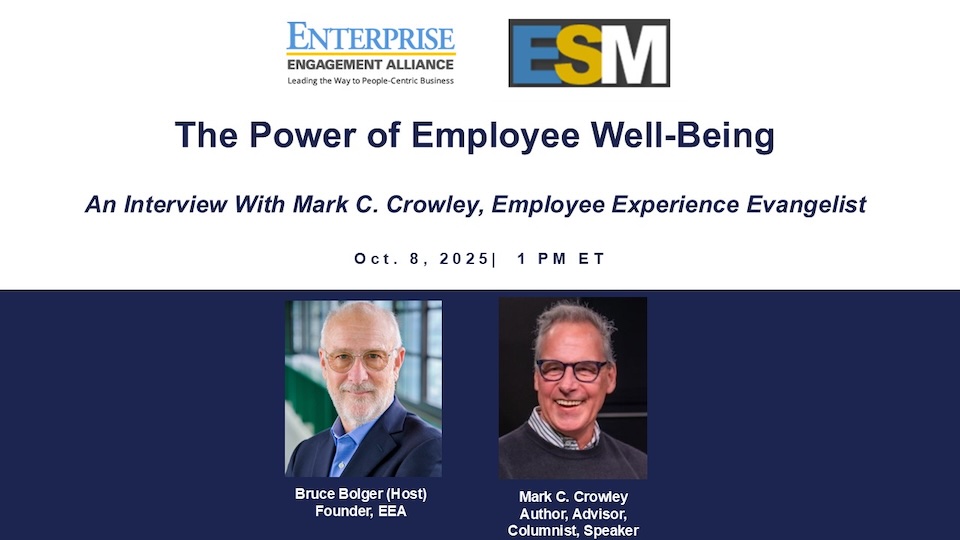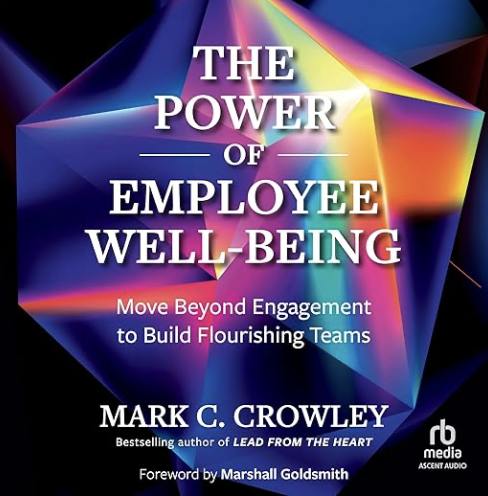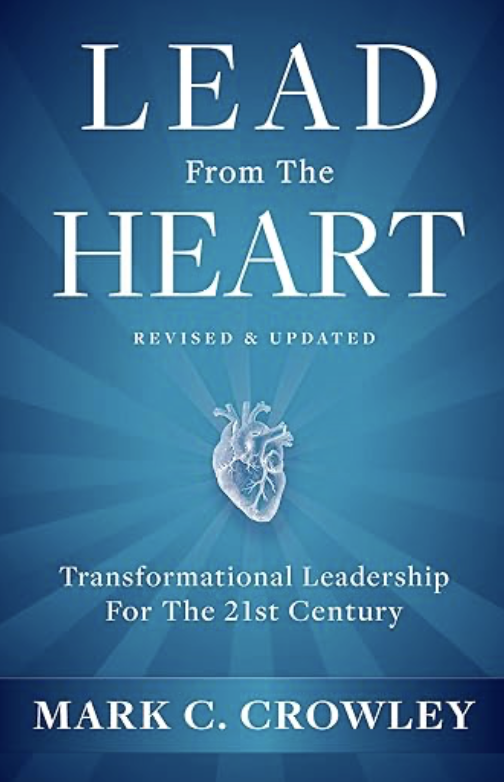EEA Meaningful Meetings Spotlight: Mark C. Crowley on The Power of Employee Well-Being
 This show and ESM feature article continues the series on movers and shakers in stakeholder management as part of our Enterprise Engagement Alliance YouTube Channel and Meaningful Meetings series.
This show and ESM feature article continues the series on movers and shakers in stakeholder management as part of our Enterprise Engagement Alliance YouTube Channel and Meaningful Meetings series. About Mark Crowley
Highlights of the Show
Click here to subscribe to the ESM weekly e-newsletter.
Leadership coach Mark C. Crowley’s message is clear: “Leading from the heart” is not sentimental — it’s strategic. Organizations that align leadership with human biology and emotion will outperform those that don’t. Progress is happening, but true transformation requires courage, accountability, and a fundamental redefinition of what it means to manage people.
 This is the essence of Crowley’s advice on this recent Enterprise Engagement Alliance (EEA) YouTube show. Crowley is a leadership speaker, consultant, and author. This program highlights Crowley’s new book, The Power of Employee Well-Being, and continues EEA’s ongoing spotlight on innovators and thought leaders who are advancing stakeholder management principles and redefining workplace success.
This is the essence of Crowley’s advice on this recent Enterprise Engagement Alliance (EEA) YouTube show. Crowley is a leadership speaker, consultant, and author. This program highlights Crowley’s new book, The Power of Employee Well-Being, and continues EEA’s ongoing spotlight on innovators and thought leaders who are advancing stakeholder management principles and redefining workplace success.Click here to view or listen to the show.
In his latest book, the Power of Employee Well-Being, Crowley makes a compelling case: prioritizing employee well-being is not only a moral imperative but also a proven driver of organizational performance. Drawing on scientific research, organizational case studies, and decades of his own leadership experience in finance, Crowley demonstrates that when leaders authentically invest in people’s holistic well-being—physical, emotional, financial, and social—engagement and productivity rise while turnover and burnout fall.
About Mark Crowley 
Crowley has long been recognized as a pioneer in advocating for a people-centered approach to leadership. He was just named to Inc.’s Top Leadership and Management Experts. His first book, Lead From the Heart, was an influential work that challenged conventional management thinking by underscoring the power of emotional connection, compassion, and trust in business. He has since become a sought-after speaker, podcaster, and advisor to leaders around the world who want to humanize their leadership practices.
Crowley’s contributions to leadership research and practice have made him a leading voice in the movement to align business strategy with human needs. His insights have been featured in major media outlets, business schools, and executive education programs, helping organizations understand that employee well-being is inseparable from business well-being.
Highlights of the Show
1. The Evolution and Current State of People Management—About Half-Way There
Crowley believes that while awareness of people-focused leadership has grown, progress remains limited — we’re only in the “third or fourth inning” of a long game. He argues that despite decades of research showing that engagement and well-being drive productivity, most organizations still lead with outdated, fear-based management styles.
- A setback: The recent explosion of AI has triggered fear among corporate leaders, especially in tech, causing many to revert to old command-and-control practices.
- Encouraging signs: Outside the tech sector, he sees growing momentum. Scholars and business leaders are affirming that a well-being-centered model is taking hold as organizations struggle with turnover, burnout, and disengagement.
Crowley calls for a systemic paradigm shift in leadership — one that recognizes human beings as emotional as well as rational.
- Lead from the heart: True leadership begins with empathy, care, and creating psychological safety. He emphasizes that this isn’t “soft” or “sentimental,” but rooted in biology — the heart and brain communicate constantly via the vagus nerve, and positive emotions lead to “coherence,” which optimizes human performance, he contends.
- Manager accountability: His new book, The Power of Wellbeing, argues that well-being should be a measurable management responsibility. Organizations must move beyond yearly engagement surveys toward real-time pulse surveys that measure whether employees feel supported, coached, and valued.
- Data and measurement: Like total quality management in manufacturing, people management should use data to track outcomes such as turnover, absenteeism, and productivity to show the financial benefits of caring cultures.
Several deep-rooted factors hinder progress, he observes.
- Cultural resistance: The “heart” language still triggers skepticism in business circles accustomed to analytical, results-only thinking.
- MBA conditioning: Business education has historically focused on manipulating financial statements, not leading people. Leaders are trained to cut costs (including jobs) to meet quarterly targets, without understanding the long-term damage to trust and performance.
- Short-termism: Hedge funds and investors often push for fast financial results, discouraging CEOs from long-term, human-centered strategies.
- False progress: Many companies engage in “virtue signaling” — public gestures toward stakeholder capitalism or engagement — without structural change.
Crowley stresses that the most talented people — those who can choose where they work — are the first to leave toxic environments. Sustainable success, therefore, depends on genuine care for employees’ well-being.
- Studies from Oxford University show a direct link between employee well-being and weekly productivity.
- Engagement has remained stagnant (around 30%) for over a decade, proving that traditional engagement efforts fail because they lack accountability.
- Companies that foster authentic well-being see greater loyalty, innovation, and financial results — because people perform best when they feel safe, appreciated, and supported.
Crowley feels cautious optimism. He expects the shift toward human-centered leadership to accelerate as:
- Investors recognize that short-term exploitation creates long-term financial risk.
- Consumers and employees vote with their wallets and feet, rewarding companies that treat people well and punishing those that don’t.
- Measurement tools and analytics that make the human performance link undeniable.
- He predicts the potential for a “100-monkey” effect — once enough leaders adopt this model, it will spread rapidly across industries.
- Acknowledge human nature: 95% of human behavior is emotionally driven — lead accordingly.
- Redefine management as stewardship: Leaders should see themselves as caretakers of people who enable organizational success.
- Institutionalize well-being: Make it a strategic and measurable priority, not a wellness perk.
- Play the long game: Resist short-term investor pressures and build value through people, not at their expense.
- Model empathy with discipline: Compassion and accountability are not opposites — they reinforce each other.
Enterprise Engagement Alliance Services
 Celebrating our 15th year, the Enterprise Engagement Alliance helps organizations enhance performance through:
Celebrating our 15th year, the Enterprise Engagement Alliance helps organizations enhance performance through:1. Information and marketing opportunities on stakeholder management and total rewards:
- ESM Weekly on stakeholder management since 2009. Click here to subscribe; click here for media kit.
- RRN Weekly on total rewards since 1996. Click here to subscribe; click here for media kit.
- EEA YouTube channel on enterprise engagement, human capital, and total rewards since 2020
 Management Academy to enhance future equity value for your organization.
Management Academy to enhance future equity value for your organization.3. Books on implementation: Enterprise Engagement for CEOs and Enterprise Engagement: The Roadmap.
4. Advisory services and research: Strategic guidance, learning and certification on stakeholder management, measurement, metrics, and corporate sustainability reporting.
5. Permission-based targeted business development to identify and build relationships with the people most likely to buy.
Contact: Bruce Bolger at TheICEE.org; 914-591-7600, ext. 230.














